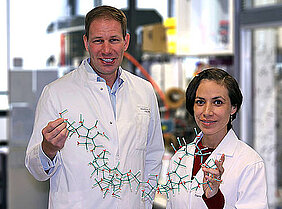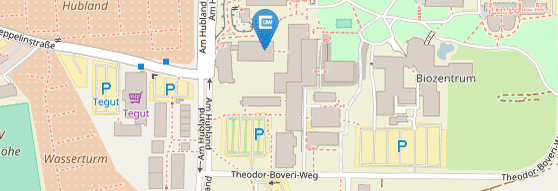Generating Sugars with Special Functions
11/09/2016They stimulate the immune system and regulate the intestinal flora: Functional sugars are of high interest for many applications. A new German-Mexican project is dedicated to the development of improved synthetic methods for such kind of sugars.

Many sugar molecules with a more complex structure are beneficial to health. There are milk oligosaccharides for instance, which stimulate the immune system. And there are other oligosaccharides with so called prebiotic features: Once they have reached the intestines, they promote the growth of certain bacteria, which in turn hold at bay diarrhea pathogens and other pathogenic germs.
Challenging Syntheses
According to Jürgen Seibel “Customized sugars with clearly defined functions are of particular interest for many applications in the fields of medicine and nutrition.” The fabrication of such sugars, however, has been a rather challenging scientifically task.
Professor Seibel further explains: “In the chemical synthesis of sugars it’s especially tricky to precisely control the molecular structure.” And there’s yet another challenge. Food industry and pharmaceutical industry demand the synthetic processes to be ecologically and economically sustainable.
Cooperation with the University of Mexico
Therefore, Seibel’s team aims at the development of a biotechnological process for synthesizing functional sugars, which is suitable on an industrial scale. The new project is a cooperation with the research group of Professor Agustín López-Munguía Canales at the University of Mexico (UNAM). It is financially supported by the German Federal Ministry of Education and Research (BMBF) and the National Science and Technology Council of the Mexican government CONACYT (Consejo Nacional de Ciencia y Tecnología) providing EUR 250,000.
The international research group focuses on environment friendly enzymatic production processes as well as using the renewable resource sucrose as a raw material. Sucrose is the kind of sugar that can be directly extracted from sugar beets and other plants. “With a production of 61 million tons in 2015 Mexico was in sixth place of the most important sugar cane producing countries, whereas Europe is the worldwide biggest enzyme producer with a high reputation in the field of industrial biotechnology” explains Professor Seibel.
Symposium in Mexico City
An important aspect for the two funding institutions, BMBF and CONACYT, is the intensification of the cooperation between universities and industry in both countries, on the occasion of the German-Mexican Year. Therefore, both institutions organise a science and technology symposium to be held on 14 and 15 November 2016 in Mexico City. Seibel’s team, among others, is invited to present their research and open up new perspectives for science and technology.
Contact
Prof. Dr. Jürgen Seibel, Institute of Organic Chemistry, University of Würzburg, phone +49 931 31-85326, seibel@chemie.uni-wuerzburg.de


